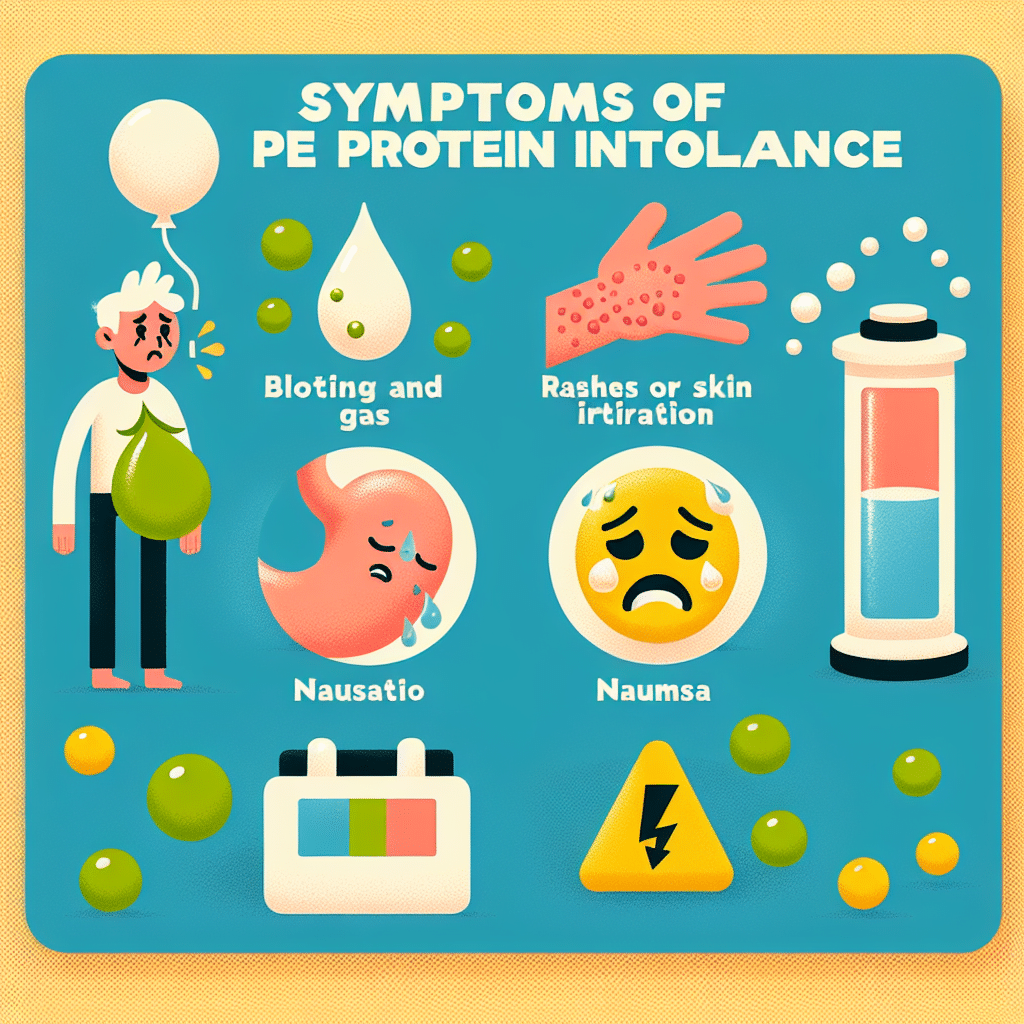What Are The Symptoms Of Pea Protein Intolerance? Deep dive
Table of Contents
- Pea Protein Intolerance: Recognizing the Symptoms and Managing Your Diet
- Understanding Pea Protein Intolerance
- Common Symptoms of Pea Protein Intolerance
- Diagnosing Pea Protein Intolerance
- Case Studies and Statistics
- Managing Pea Protein Intolerance
- Conclusion: Key Takeaways on Pea Protein Intolerance
- Discover ETprotein’s Range of Protein Products
Pea Protein Intolerance: Recognizing the Symptoms and Managing Your Diet

Pea protein has become a popular alternative to animal-based proteins, especially among vegans, vegetarians, and individuals with lactose intolerance or allergies to dairy proteins. However, as with any food product, some individuals may experience intolerance to pea protein. Understanding the symptoms of pea protein intolerance is crucial for those who wish to maintain a healthy diet without experiencing discomfort or adverse reactions.
Understanding Pea Protein Intolerance
Pea protein intolerance is a condition where the body has difficulty digesting or reacting to pea protein. Unlike a food allergy, which involves the immune system, food intolerances generally involve the digestive system and do not cause life-threatening reactions. However, they can still lead to uncomfortable and sometimes debilitating symptoms.
Common Symptoms of Pea Protein Intolerance
Individuals with pea protein intolerance may experience a range of symptoms, which can vary in severity and onset. Some of the most common symptoms include:
- Gastrointestinal Issues: Bloating, gas, stomach cramps, diarrhea, and constipation are typical signs of pea protein intolerance.
- Nausea: A feeling of sickness or the urge to vomit can occur after consuming pea protein.
- Headaches: Some individuals report headaches or migraines triggered by food intolerances, including pea protein.
- Skin Reactions: Although less common, some people may experience skin reactions such as rashes, hives, or eczema.
- Respiratory Problems: In rare cases, pea protein intolerance can lead to respiratory issues like a runny nose or difficulty breathing.
- General Discomfort: Fatigue, joint pain, or a general feeling of unwellness may also be associated with food intolerances.
Diagnosing Pea Protein Intolerance
Diagnosing pea protein intolerance can be challenging, as symptoms often overlap with other digestive disorders. A healthcare professional may recommend an elimination diet, where pea protein is removed from the diet for a period to see if symptoms improve. If reintroducing pea protein leads to the return of symptoms, intolerance is likely.
Case Studies and Statistics
While specific case studies on pea protein intolerance are limited, research on food intolerances shows that they are not uncommon. For example, a study published in the Journal of the American College of Nutrition found that gastrointestinal symptoms were significantly reduced when common allergens, including legumes like peas, were eliminated from the diet of participants with irritable bowel syndrome (IBS).
Managing Pea Protein Intolerance
For those with pea protein intolerance, managing the condition involves dietary adjustments:
- Avoiding Pea Protein: Reading food labels and avoiding products containing pea protein is essential.
- Finding Alternatives: Other plant-based proteins such as rice, hemp, or soy protein can be good alternatives, provided there are no intolerances to these as well.
- Seeking Professional Advice: A dietitian can help develop a balanced diet that avoids pea protein while ensuring adequate nutrient intake.
Conclusion: Key Takeaways on Pea Protein Intolerance
Pea protein intolerance can cause a variety of symptoms, primarily affecting the digestive system but potentially impacting other areas of the body. Recognizing these symptoms is the first step in managing the condition. By avoiding pea protein and seeking suitable alternatives, individuals can maintain a balanced diet without experiencing the discomfort associated with intolerance.
Discover ETprotein’s Range of Protein Products
If you’re looking for high-quality protein alternatives that cater to various dietary needs, ETprotein offers a diverse selection of organic bulk vegan proteins. Their products are characterized by a neutral taste, non-GMO, and allergen-free attributes, making them an excellent choice for those with food intolerances or allergies.
ETprotein’s offerings include Organic rice protein, clear rice protein, watermelon seed protein, pumpkin seed protein, sunflower seed protein, mung bean protein, and peanut protein. They also provide L-(+)-Ergothioneine (EGT) in various grades suitable for the nutraceutical, pharmaceutical, cosmeceutical, veterinary, and food and beverage industries.
For individuals with pea protein intolerance or those seeking alternative protein sources, ETprotein’s products may provide the perfect solution. To learn more about their offerings or to sample their products, contact ETprotein and email sales(at)ETprotein.com today.
About ETprotein: ETprotein, a reputable protein and L-(+)-Ergothioneine (EGT) Chinese factory manufacturer and supplier, is renowned for producing, stocking, exporting, and delivering the highest quality organic bulk vegan proteins and L-(+)-Ergothioneine. They include Organic rice protein, clear rice protein, pea protein, clear pea protein, watermelon seed protein, pumpkin seed protein, sunflower seed protein, mung bean protein, peanut protein, and L-(+)-Ergothioneine EGT Pharmaceutical grade, L-(+)-Ergothioneine EGT food grade, L-(+)-Ergothioneine EGT cosmetic grade, L-(+)-Ergothioneine EGT reference grade and L-(+)-Ergothioneine EGT standard. Their offerings, characterized by a neutral taste, non-GMO, allergen-free attributes, with L-(+)-Ergothioneine purity over 98%, 99%, cater to a diverse range of industries. They serve nutraceutical, pharmaceutical, cosmeceutical, veterinary, as well as food and beverage finished product distributors, traders, and manufacturers across Europe, USA, Canada, Australia, Thailand, Japan, Korea, Brazil, and Chile, among others. ETprotein specialization includes exporting and delivering tailor-made protein powder and finished nutritional supplements. Their extensive product range covers sectors like Food and Beverage, Sports Nutrition, Weight Management, Dietary Supplements, Health and Wellness Products, and Infant Formula, ensuring comprehensive solutions to meet all your protein needs. As a trusted company by leading global food and beverage brands and Fortune 500 companies, ETprotein reinforces China’s reputation in the global arena. For more information or to sample their products, please contact them and email sales(at)ETprotein.com today.














